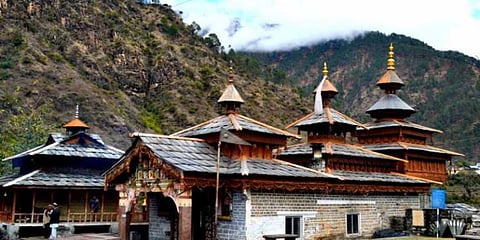

A break in the clouds gives me a glimpse of the Jaunsar and Bawar—twin mountainous regions in the north-west of Uttarakhand. And Till Kingdom Come takes me back in time to a place where not so quiet flows the River Tons. I first made that journey in the fall of 1975, and a few memories survive. Foremost among them is that rattle-trap of a bus bumping along a pot-holed road carved out of a mountain face.
Come meet the intrepid Lokesh Ohri, scholar-author-historian extraordinaire, as he takes us to Hanol on a journey through the narrow gorges and deep valleys of the Tons. It is a land of magical spells, where he takes us to the temple of Mahasu Devta, which is unlike any other temple in the plains.
And this is Mahasu’s domain. This is where he reigns supreme as his oracles deliver verdicts choosing candidates, temple priests endorse electoral candidates, and it is said that during the British Raj, even officials capitulated to Mahasu’s authority. But that was too good to last. Post the events of 1857, there was a hardening of attitudes on both sides and officials of the Raj such as Emerson, Atkinson, Young and Williams were disparaging towards local beliefs and turned ugly partisan.
That in turn gave birth to the bitter fruit that came in the shape of the Tilari Kand (of 1929-30), and the Dhami Rebellion (of 1939-40). However, Mahasu forges a unique political and social system over which he reigns. As the Chalda Mahasu, he travels constantly, carried in a processon in a box-like palanquin (And no ordinary palanquins her. These are gilded with pure silver hammered together by silversmiths from Kumaon to make a vehicle fit for a divine king) speaking to the people through his servitors.
Elsewhere, the Gazetteer of Sirmur State (1934) tells us of a girl who arrived in Sirmur. The Raja challenged the woman to walk safely over the Giri river on a rope and offered her half his kingdom if she accomplished the feat successfully.
The woman accepted the challenge and a rope was stretched across the river. But before starting the woman vowed that if she should fall victim to any treachery on the part of the Raja, a curse would fall on the city which would be destroyed by an awful catastrophe, exterminating every living soul.
The woman was crossing safely when some of the Raja’s people cut the rope—doubtless with the Raja’s knowledge—and she fell into the river and drowned. The prophecy was fulfilled and annihilation did come.
A flash flood wiped out the king, his family and his sole heir too. It’s that kind of fascinating read, especially for those who want to understand the finer nuances of life lived in the mountains of the Western Himalayas.